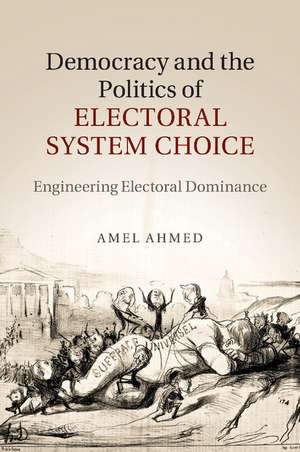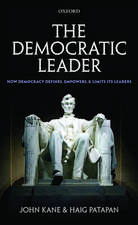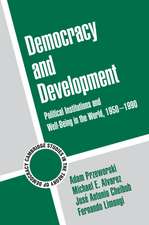Democracy and the Politics of Electoral System Choice: Engineering Electoral Dominance
Autor Amel Ahmeden Limba Engleză Paperback – 31 dec 2014
| Toate formatele și edițiile | Preț | Express |
|---|---|---|
| Paperback (1) | 282.48 lei 6-8 săpt. | |
| Cambridge University Press – 31 dec 2014 | 282.48 lei 6-8 săpt. | |
| Hardback (1) | 750.25 lei 6-8 săpt. | |
| Cambridge University Press – 21 noi 2012 | 750.25 lei 6-8 săpt. |
Preț: 282.48 lei
Nou
Puncte Express: 424
Preț estimativ în valută:
54.08€ • 56.42$ • 45.33£
54.08€ • 56.42$ • 45.33£
Carte tipărită la comandă
Livrare economică 12-26 martie
Preluare comenzi: 021 569.72.76
Specificații
ISBN-13: 9781107484139
ISBN-10: 1107484138
Pagini: 242
Ilustrații: 2 b/w illus. 10 tables
Dimensiuni: 153 x 229 x 13 mm
Greutate: 0.33 kg
Editura: Cambridge University Press
Colecția Cambridge University Press
Locul publicării:New York, United States
ISBN-10: 1107484138
Pagini: 242
Ilustrații: 2 b/w illus. 10 tables
Dimensiuni: 153 x 229 x 13 mm
Greutate: 0.33 kg
Editura: Cambridge University Press
Colecția Cambridge University Press
Locul publicării:New York, United States
Cuprins
1. Introduction: contradictions and ambiguities of democratization; 2. Strategies of containment: the role of repression and accommodation; 3. Strategies of competition: the logic of electoral system choice, single member plurality (SMP) vs. proportional representation (PR); 4. The United States: pre-industrial democratization and the origins of SMP; 5. The United Kingdom: safeguarding the Reform Acts with SMP; 6. France: the tumultuous path of electoral system choice in the Third Republic; 7. Belgium: minimizing the existential threat with PR; 8. Conclusions: rethinking democracy's determinisms; Appendix: the existential threat - electoral viability and ideological radicalism.
Recenzii
'By focusing on the strategies and motives of pre-democratic political elites, Ahmed's comparative analysis sheds new light on the determinants of electoral reform in early democratizers. Her study shows how the careful reconstruction of the politics behind key institutional choices can provide significant insights into the process of democratization as a whole. This book breaks new theoretical and empirical ground, and will constitute important reading for scholars of democratization in all periods.' Giovanni Capoccia, University of Oxford
'Democracy and the Politics of Electoral System Choice investigates the political origins of democracy in the nineteenth century. In a fascinating twist on politics-as-strange-bedfellows, Amel Ahmed finds that economic elites supported democratic electoral institutions to safeguard their own positions in the new democratic order. This wonderful, counterintuitive, myth-busting book holds crucial lessons both for students of institutional analysis and for those who care about the abysmal performance of party politics in the post-industrial age.' Cathie Jo Martin, Boston University, and former chair of the Council for European Studies
'In this comparative analysis of the evolution of electoral institutions in Belgium, Britain, France, and the United States, Amel Ahmed pushes forward the agenda of 'historicizing' the study of democratization. The result is an argument that rethinks these crucial cases but also has a broader lesson: methods of exclusion and containment rather than being antithetical to democracy may, historically, have been at the heart of democracy itself. This provocative and important insight should be taken seriously by scholars of contemporary authoritarianism and democracy as well as by students of political institutions more generally.' Daniel Ziblatt, Harvard University
'Democracy and the Politics of Electoral System Choice investigates the political origins of democracy in the nineteenth century. In a fascinating twist on politics-as-strange-bedfellows, Amel Ahmed finds that economic elites supported democratic electoral institutions to safeguard their own positions in the new democratic order. This wonderful, counterintuitive, myth-busting book holds crucial lessons both for students of institutional analysis and for those who care about the abysmal performance of party politics in the post-industrial age.' Cathie Jo Martin, Boston University, and former chair of the Council for European Studies
'In this comparative analysis of the evolution of electoral institutions in Belgium, Britain, France, and the United States, Amel Ahmed pushes forward the agenda of 'historicizing' the study of democratization. The result is an argument that rethinks these crucial cases but also has a broader lesson: methods of exclusion and containment rather than being antithetical to democracy may, historically, have been at the heart of democracy itself. This provocative and important insight should be taken seriously by scholars of contemporary authoritarianism and democracy as well as by students of political institutions more generally.' Daniel Ziblatt, Harvard University
Notă biografică
Descriere
This book explores the dynamics of electoral system choice and raises questions about the democratic credentials of the early processes of democratization.















